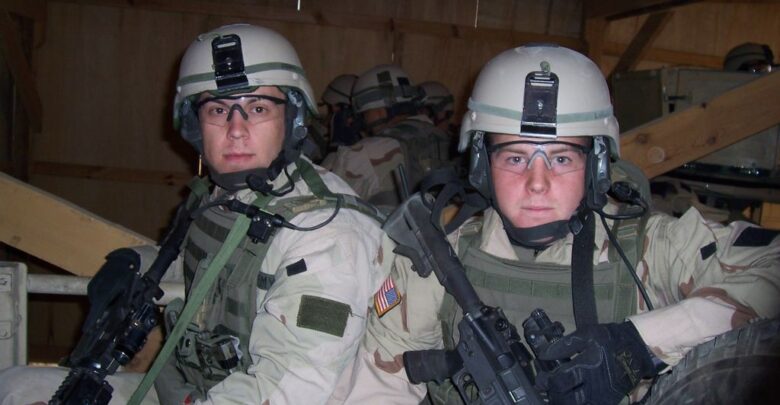

America’s military veterans have shifted their focus on this 20th anniversary of the terrorist attacks on September 11, 2001 — from memorializing their fallen colleagues to aiding in efforts to rescue allies in Afghanistan.
The end of a 20-year war, first declared by former President George W. Bush in 2001, brought mixed emotions for veterans who served in Iraq and Afghanistan. Some rejoiced as longtime advocates of ending what has now become known as the “forever war”; others were horrified that the Taliban had retaken control after Americans valiantly fought to eliminate the terrorist organization from Afghanistan.
Former Army Ranger Dr. Tony Brooks was 18 years old when he watched hijacked planes strike the Twin Towers on live television, along with an estimated 4 million people who tuned in to watch the tragedy unfold within 10 minutes of the first crash. Brooks, preparing for a workout, stood horrified in front of the television as now-infamous footage played of a person falling from one tower.
Brooks vowed at that moment that he had to do something. He dropped out of college and enlisted in the Army. He was deployed to Afghanistan soon afterward.

“9/11 is more than just that tragic day. To me, it was a change in lifestyle, from college lifestyle to war,” Brooks told Zenger.
A covert effort called Operation Red Wings took a turn for the worse shortly after Brooks’ deployment, when Navy Seal Marcus Luttrell became stranded in the Kunar Province mountains after an ambush by Taliban forces left the other three soldiers in his party dead. A rescue helicopter carrying 16 U.S. soldiers was sent to rescue Luttrell, but Taliban forces shot it down, killing everyone on board. Brooks was on a second helicopter.
The mission was later depicted by Hollywood in the 2013 film “Lone Survivor,” starring Mark Wahlberg.

With the final U.S. troops withdrawn from Afghanistan after 20 years, and Taliban soldiers in control of the country, some veterans feel hopeless about their role in the “forever war”: Did their sacrifices mean anything?
“It felt like we just witnessed the Titanic sink. And the captain’s out there saying, ‘Look how many people we got on the lifeboats,’” said Brooks.
President Joseph R. Biden estimated that there were 100 to 200 Americans left who had “some intention to leave” in a speech on August 31, the date he set as the deadline for U.S. military evacuation. Yet the number of native Afghans left behind who were America’s allies may be far higher.
“One of the things that we hold really dear to our hearts in the military is that if you help us and you work with us, if you’re allied, we’ll literally go to hell to get you back. We never leave our allies behind,” said Brooks.
He said despite a cascade of mixed reactions that followed the withdrawal, veterans should be certain that their work mattered.
“It wasn’t for nothing,” said Brooks, who recently penned his telling of the story in his book “Leave No Man Behind.”
“I think there’s enough people over there that have experienced freedom, and they’re going to fight. You see that women are protesting in the streets and uprising. And I think the only reason that’s happening is because of the efforts of the Americans over there.”

Other veterans are quick to welcome the end of a war effort that four U.S. presidents have commanded.
“I think that pulling out was the right thing for President Biden to do. It was long overdue,” retired U.S. Air Force Major Eric Wayne Yates told Zenger. “But I do have major problems with how he did it. Collapsing the military bases that we had in Kandahar and Bagram — that should have been one of the last things we did.”
“There was a tremendous sense of self of misguided understanding of what could have been in Afghanistan. That’s up to the Afghans, and it always has been,” said Yates, who is a volunteer veteran aid worker with the Veterans of Foreign Wars.
President Biden has faced criticism over his handling of the hasty Afghanistan withdrawal, which he called an “extraordinary success.” A Reuters poll found that more than half of American adults, 51 percent, disapproved of the way the mass departure played out.
For some veterans, especially those with personal connections in Afghanistan, their priority now is helping in the effort to rescue Afghan allies and civilians.
“We have quite a few members working on their connections with Afghan allies and the Afghan people. We have a lawyer who is supporting refugee processing, and our members bring refugees food, blankets, and clothing,” About Face: Veterans Against War interim organizing director Natasha Erskine told Zenger.
“We are encouraging self-determination for our Afghan allies,” said Erskine. “Our work is not a charity mindset, but comes from a deeply personal place. Veterans have a strong culture of peer support and allyship.”
Edited by David Martosko and Kristen Butler
The post Veterans Reflect On The 20th Anniversary Of 9/11 appeared first on Zenger News.



